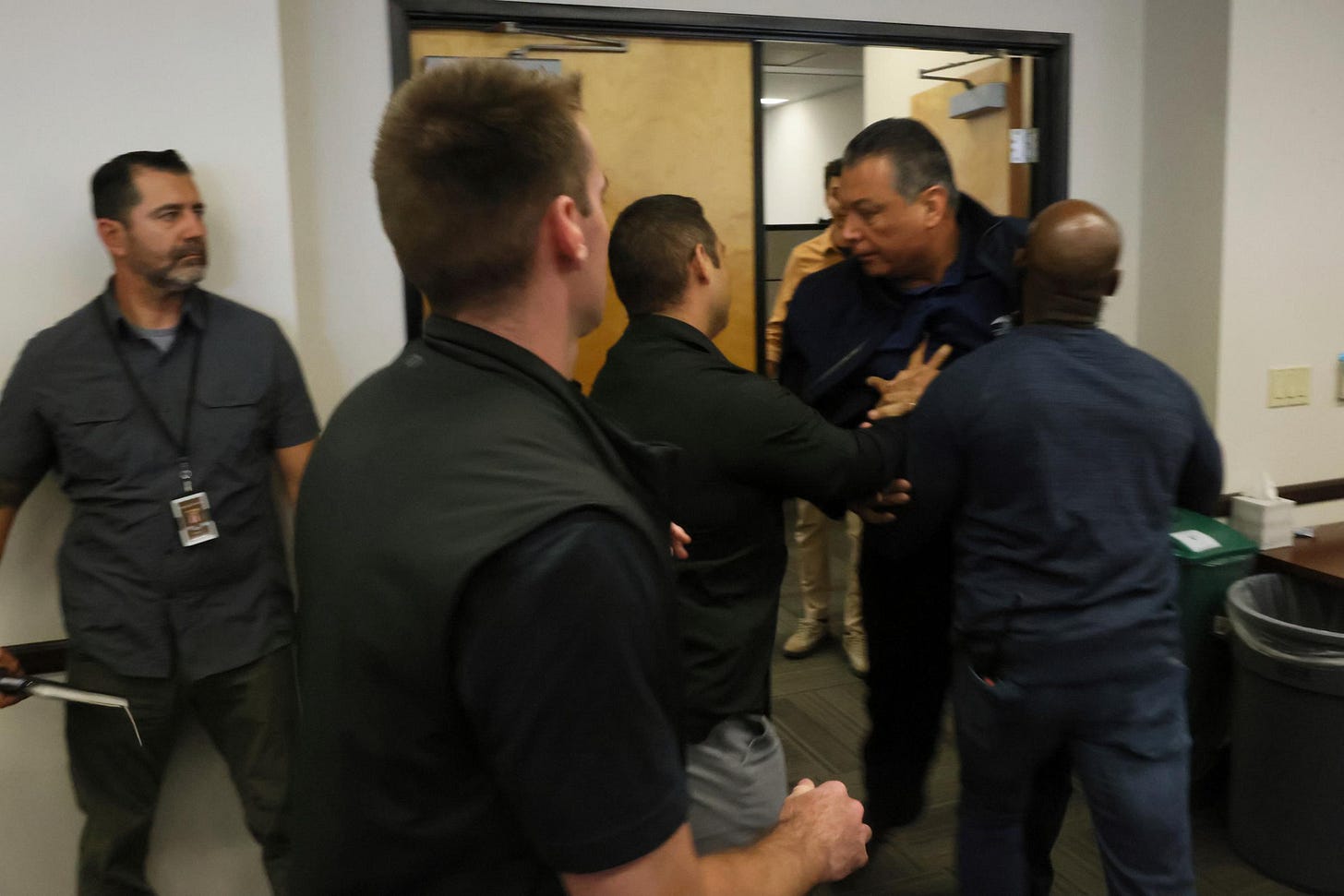As the son of Mexican immigrants, I know firsthand the hopes and struggles that bring families to America. Like millions before them, my parents came here seeking a better life. They worked hard, paid their taxes, and believed in the promise that anyone willing to contribute could find opportunity in this country. That promise is now being tested like never before.
The recent incident in Los Angeles, where US Senator Alex Padilla, a son of immigrants, was forcibly removed, tackled to the ground, and handcuffed after trying to ask questions about immigration policy, is more than a headline. It’s a moment that should concern every American, no matter where you live or how you vote. This event is just the latest chapter in a long story of struggle, resilience, and hope for immigrants and their children in the United States.

The story of Latino immigrants is just one chapter in a much larger American narrative. Throughout our history, newcomers from every corner of the globe have faced discrimination, hardship, and exclusion, yet each group has also made profound contributions to the fabric of our nation.
In 1882, the U.S. government passed the Chinese Exclusion Act, the first federal law to ban immigration based on nationality. This law explicitly targeted Chinese laborers, barring them from entering the country and making it nearly impossible for those already here to become citizens. Families were torn apart, businesses were destroyed, and entire communities were forced to live in isolation. Chinese immigrants faced years of government scrutiny, detention at places like Angel Island, and the constant threat of deportation.
The Irish experience is another story of struggle and perseverance. In the mid-1800s, millions of Irish fled their homeland to escape the devastation of the Great Hunger. Many arrived in America sick, poor, and desperate, only to face harsh discrimination and dangerous working conditions. Irish immigrants were often forced to live in crowded, unsanitary neighborhoods and were blamed for crime and disease. They were also targeted by nativist groups who saw them as threats to American jobs and values.
Jewish immigrants have faced their own unique struggles. In the late 19th and early 20th centuries, millions of Jews fled persecution and violence in Eastern Europe, only to encounter anti-Semitism and exclusion in America. During the Civil War, General Order No. 11 expelled Jews from parts of the South, a shocking act of official discrimination that was later overturned.
Like these groups before them, Latino immigrants have faced deportation, discrimination, and exclusion. During the Great Depression, hundreds of thousands of Mexican immigrants, including many U.S. citizens, were forcibly sent to Mexico. Some were tricked or coerced into leaving, while others were simply rounded up because of their heritage.
In the 1950s, “Operation Wetback” led to mass deportations and family separations. Again, many of those targeted were actually U.S. citizens, swept up in raids simply because of their appearance. More recently, in the 1980s and ‘90s, families from Central America fled violence, only to find new challenges here. These periods left deep scars in Latino communities, as families were torn apart and civil rights were ignored. Even today, families who have lived here for years, built businesses, and raised children can be targeted simply because of how they look or where they were born.
The struggles of Chinese, Irish, Jewish, Latino, and other immigrants remind us that exclusion and discrimination are not new. But so is the story of resilience, community, and the determination to build a better future. These experiences continue to shape who we are as a nation. When we talk about immigration policy, we are talking about the engine of American prosperity. The contributions of Latino and immigrant communities are woven into the fabric of our nation, powering growth, innovation, and opportunity for all Americans.
Throughout our history, immigrants have stepped up when America needed them most. During World War I, World War II, and the Vietnam War, millions of immigrants and their children served in the armed forces, fought for freedom, and worked in factories, shipyards, and farms to support the war effort. Their labor and sacrifice were essential to the nation’s survival and success during those critical years.
In the days and weeks after the September 11, 2001, attacks, immigrants stepped forward to help rebuild and heal New York City. Thousands of workers, many of them undocumented immigrants from Latin America, Poland, and other countries, responded to the urgent call for help at Ground Zero. They took on dangerous, dirty jobs clearing debris, cleaning hazardous materials, and helping to restore the city, often without regard for their own safety or immigration status. These workers faced health risks and, years later, many suffered from illnesses related to their exposure to toxic dust. Their bravery and sacrifice played a crucial role in the city’s recovery and stand as a powerful example of immigrants’ willingness to serve America in its time of need.
During the COVID-19 pandemic, immigrants were on the front lines as healthcare workers, farm laborers, and essential employees, keeping our country running while risking their own health. Time and again, immigrants have answered the call, not just to build better lives for themselves but to help America become stronger, more resilient, and more united.
Immigrants and their children continue to face challenges, but they also bring energy, innovation, and economic vitality to communities across the country. Immigrants, including those from Latin America, play a similarly vital role. Immigrants contribute about $2.2 trillion annually to the U.S. economy, roughly 8% of the nation’s GDP. They fill essential jobs in agriculture, construction, healthcare, and technology, helping to keep Social Security and Medicare solvent and supporting industries that depend on their labor.
Today, the debate over immigration is not just happening in big cities like Los Angeles. The impact of this harsh immigration enforcement, now with military troops, is felt far beyond the border and big cities. Farmers in Iowa and Nebraska depend on immigrant labor to plant and harvest crops. Small business owners in Kansas and Missouri rely on immigrant workers to keep their shops and restaurants running. When families are separated or workers are afraid to leave their homes, everyone feels the effects. Crops go unharvested, businesses struggle to stay open, and children go to school wondering if their parents will be there when they get home.
The way we handle immigration says a lot about who we are as a country. Whether your family has been here for generations or just arrived, the answer matters for all Americans.
As someone who has spent over 30 years working to increase Latino civic participation in America, I believe we can do better. We can have honest conversations about immigration without resorting to fear or force. We can remember the lessons of our history and choose a path that brings us together, not divides us. This is not just an immigrant issue, it’s an American issue. If we want to make America great again, we need to remember who made America great again.






Well stated Mr. Ramirez. Immigrants have and continue to contribute to the what makes America great.
What rational politician would overtly advocate for folks whose first action was the criminally illegal entry into the United States https://torrancestephensphd.substack.com/p/from-al-green-to-alex-padilla